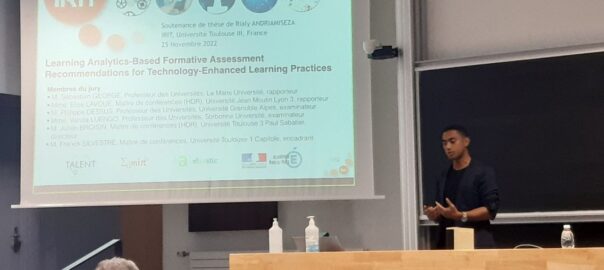Rialy Andriamiseza successfully defended his thesis “Learning Analytics-Based Formative Assessment Recommendations for Technology-Enhanced Learning Practices” on Friday 25 November 2022, before a jury composed of Sebastien George, Elise Lavoué, Vanda Luengo, Philippe Dessus, Franck Silvestre and Julien Broisin.
Congratulations to him!
Abstract: Formative assessment is a useful teaching method for improving learning and teaching. Providing teachers and learners with feedback designed to help them reach the learning objectives is at the core of every formative assessment processes. To conduct large scale formative assessment, technology-enhanced formative assessment systems emerged to support the usage of formative assessment processes. These systems generate data that can serve as a basis for improving these processes and services they provide. Consequently, we tackle the following research questions:Which useful information can be inferred from the analysis of data gathered from a tool implementing formative assessment processes used in authentic contexts? How can such information contribute to improve formative assessment processes orchestration? Based on literature and using a dataset gathered from the use of a formative assessment tool named Elaastic, we use learning analytics to provide evidence-based knowledge about formative assessment practices. This knowl- edge led us to design (i) recommendations for system designers of formative assessment tools (ii) recommendations for teachers orchestration of formative assessment sequences (iii) an orchestration model to assist teachers decision- making during the sequence.Afterwards, we put this orchestration model to the test by implement- ing it within Elaastic through explainable recommendations and collecting data of its usage. The analysis of these data provides evidences that show that (1) teachers do not follow the recommendations and (2) if teachers had followed them, there would be significantly improved benefits for learners. Future works discuss the way our orchestration model could be improved and expanded to other contexts.
